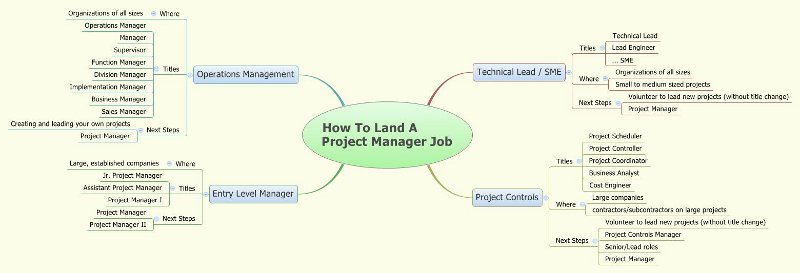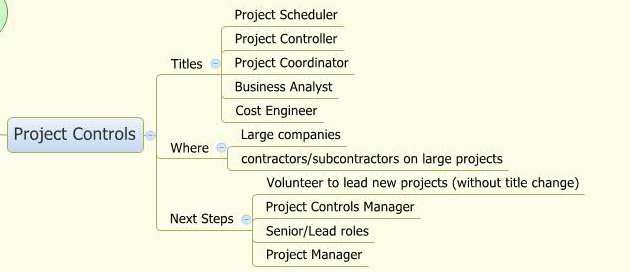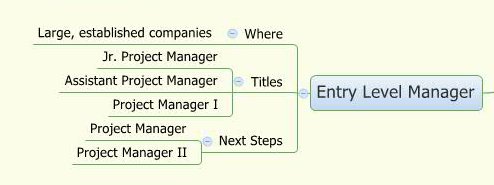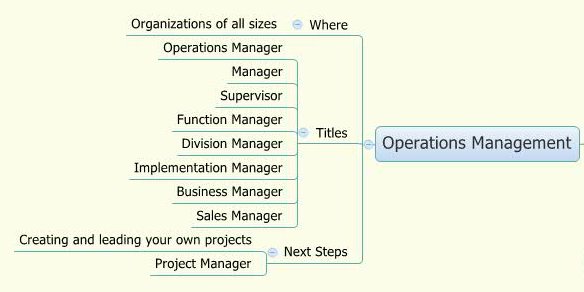
A great discussion about pursuing a project management role on the LinkedIn group recently spurred me to put together some more in-depth information for you today.
Sometimes it’s easy for me to forget that many of you may not know about the many routes available to you for landing a project management job.
Believe it or not, I have gone down all of these paths (each and every one) during my career at different companies. When you target a specific company or industry you want to manage projects in, there are going to be different strategies for moving your way towards your desired role.
Many of you may find out that one of these other roles are really what you love to do. The other roles I list here are disciplines in and of themselves. Business Analyst, Project Controls, and Operations Management are disciplines with their own bodies of knowledge and career paths too.
Go to LinkedIn and start searching for “project management” or “project manager” and the rest of these job titles. Use what you find to do new searches. You’ll find interesting companies and interesting people this way.
If you want to delve further into landing a project management job, I invite you to learn with me. I also invite all of you to leave comments on this post with your additions to what I’ve missed and any specific questions you have.
Let’s get started.
Technical Lead / SME

You are coming from a technical or subject matter expert background, meaning you have experience and skill at the craft work. These is a common path into project management, and I maintain that every project manager should have at least a foundational knowledge of the work being done by their teams. You can gain that base level of knowledge in other ways, but if you already have the experience you are set.
This path into project management is available in organizations of all sizes, usually starting out with small or medium-sized projects where you are comfortable with the domain knowledge. Usually it starts with volunteering to lead projects alongside your lead technical work, and there may be many months or more before you may have an opportunity to transition to a project manager in title. Don’t let that bother you, many of my promotions have been a direct result of me doing that job without any raise or title change for 3-12 months. It’s a sure way to prove to management you can do the job and do it well.
Titles
- Technical Lead
- Lead Engineer
- … SME
Where
- Organizations of all sizes
- Small to medium sized projects
Next Steps
- Volunteer to lead new projects (without title change)
- Project Manager
Project Controls

This is one of the most overlooked and in my opinion, undervalued disciplines and means of landing a project manager job if that’s what you are going for.
You will find most of these roles in large organizations, or with contract work on large projects. The company may be tiny but if they are a subcontractor on a large government project for example, especially with Earned Value Management (EVM) requirements in place, you will find project controls roles. Aside from what I’ve already listed, there are also specialties in risk, configuration, and change management to consider.
From one of these roles you can learn more about the projects you support and start your way towards project management. You may also find out that you love doing project controls, which is fine too. These are disciplines all by themselves, and you can spend your entire career in project controls very happy and fulfilled. You may become a sought-after expert with project planning architecture and tools like P6, Cobra, MS Project, etc.
Titles
- Project Scheduler
- Project Controller
- Project Coordinator
- Business Analyst
- Cost Engineer
Where
- Large companies
- Contractors/subcontractors on large projects
Next Steps
- Volunteer to lead new projects (without title change)
- Project Controls Manager
- Senior/Lead roles
- Project Manager
Entry Level Manager

In large established companies you may find a progression of roles when you search on LinkedIn, Indeed.com and elsewhere. Project Manager I, Project Manager II, Project Manager III, etc.
The benefit here is an organization who obviously values project management as a discipline, and has training programs and established career paths to help aspiring project managers grow in the discipline.
You will likely start out with smaller projects or assisting more experienced project managers, and as you earn trust and a good reputation in the organization, you will be given your own projects and larger projects.
Titles
- Jr. Project Manager
- Assistant Project Manager
- Project Manager I
Where
- Large, established companies
Next Steps
- Project Manager
- Project Manager II
Operations Management

Operations management was where I first started looking at project management as a formal discipline. I was the Operations Manager for a small start-up company, and realized much of what I did was project management.
In this role you have the budget and managerial authority to start new projects, for example internal process improvement or automation projects. Take something that isn’t working well and optimize it. Take something which costs a lot of labor hours and automate it with a software project. You can make a lot of progress on gaining experience this way when you learn and apply formal project management as a discipline to your work and the daily work of your teams.
You are going to have opportunities (and be able to create your own opportunities) in organizations of all sizes. Much of what is relevant to projects is relevant to operations, and vise-versa. Even if you don’t want to move to a strict “Project Manager” job role, applying project management principles to operations will never be a bad thing.
Titles
- Operations Manager
- Manager
- Supervisor
- Function Manager
- Division Manager
- Implementation Manager
- Business Manager
- Sales Manager
Where
- Organizations of all sizes
Next Steps
- Creating and leading your own projects
- Project Manager
Whew. I know that was longer than my usual, but it’s just the tip of the iceberg. I hope you learned a lot from this article, and leave a comment too.
